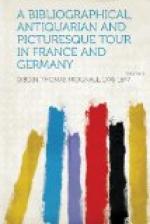I cannot boast of the commendatory strains of public Journals in my own country. No intellectual steam-engine has been put in motion to manufacture a review of unqualified approbation of the Work now submitted to the public eye—at an expense, commensurate with the ordinary means of purchase. With the exception of an indirect and laudatory notice of it, in the immortal pages of the Author of Waverley, of the Sketch book, and of Reginald Dalton, this Tour has had to fight its way under the splendour of its own banners, and in the strength of its own cause. The previous Edition is now a scarce and a costly book. Its Successor has enough to recommend it, even to the most fastidious collector, from the elegance of its type and decorations, and from the reasonableness of its price; but the highest ambition of its author is, that it may be a part of the furniture of every Circulating Library in the Kingdom. If he were not conscious that GOOD would result from its perusal, he would not venture upon such an avowal. “FELIX FAUSTUMQUE SIT!”
[1] M. Crapelet is of course speaking of the PREVIOUS
edition of the Tour.
He continues thus: “M.
Dibdin, dans son voyage en France, a visite nos
departemens de l’ouest
et de l’est, toutes leurs principales villes,
presque tous les lieux remarquables
par les antiquites, par les
monumens, par les beautes
du site, ou par les souvenirs historiques.
Il a visite les chateaux,
les eglises, les chapelles; il a observe nos
moeurs, nos coutumes; nos
habitudes; il a examine nos Musees et nos
premiers Cabinets de curiosite;
il s’est concentre dans nos
Bibliotheques. Il parle
de notre litterature et des hommes de lettres,
des arts et de nos artistes;
il critique les personnes comme les
choses; il loue quelquefois,
il plaisante souvent; la vivacite de son
esprit l’egare presque
toujours.” A careful perusal of the notes
in
THIS edition will shew that
my veracity has not “almost always led me
astray.”
[2] GABRIEL PEIGNOT; Varietes, Notices et Raretes
Bibliographiques, 1822,
8vo. p. 4.
[3] Lettre d’un Relieur Francais a un Bibliographe
Anglais; a Paris, de
l’Imprimerie de Crapelet,
1822, 8vo. p.p. 28.
[4] It is a little curious that M. Lesne has not been
singular in this
supposition. My amiable
and excellent friend M. Schweighaeuser of
Strasbourg had the same notion:
at least, he told me that the style of
the Tour very frequently reminded
him of that of Sterne. I can only
say—and say very
honestly—that I as much thought of Sterne
as I did
of ... William Caxton!




